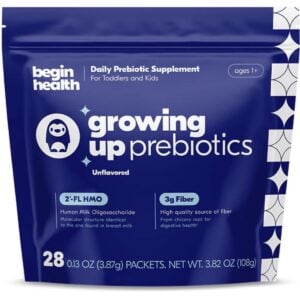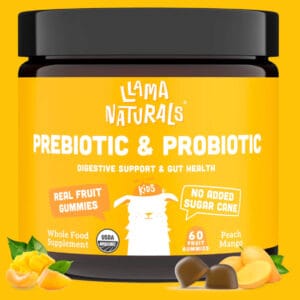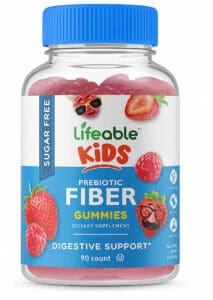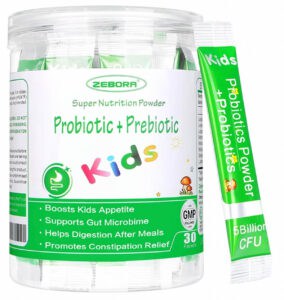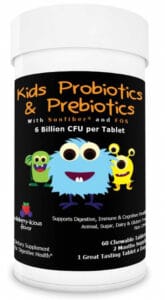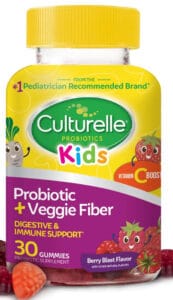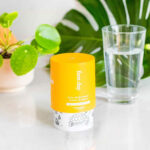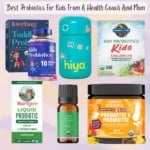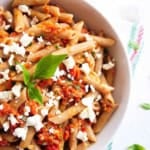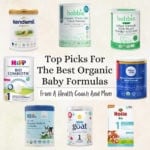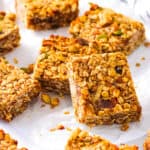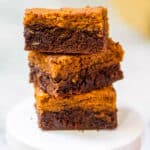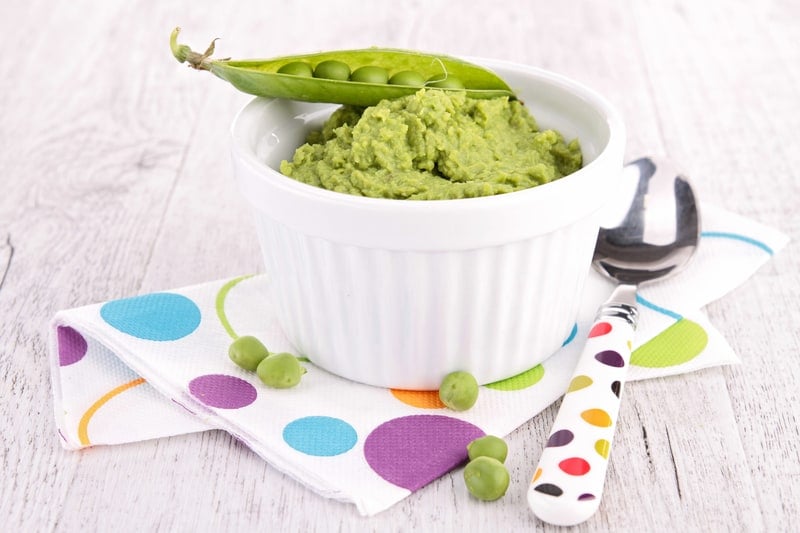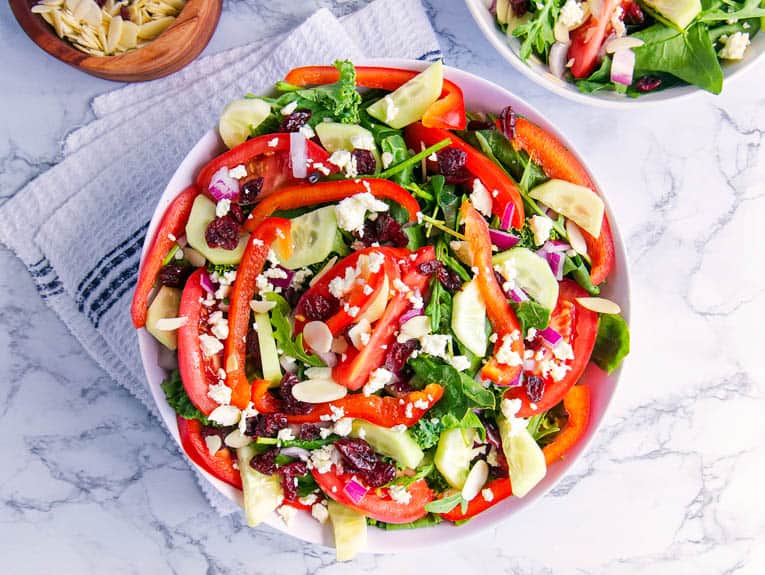Best Prebiotics For Kids (2024)
This post may contain affiliate links. As an Amazon Associate, I earn from qualifying purchases. Please read my disclosure.If you are looking for the best prebiotics for kids, you have come to the right place! In this post you can learn about why prebiotics are important and beneficial to supporting a healthy gut microbiome. You will find a helpful breakdown of my top picks for pre and probiotics for kids, along with pros and cons, price comparison, and key ingredients! Keep reading to learn if prebiotics might be the right fit for your child, the role they play in supporting healthy children, and which brands to buy.
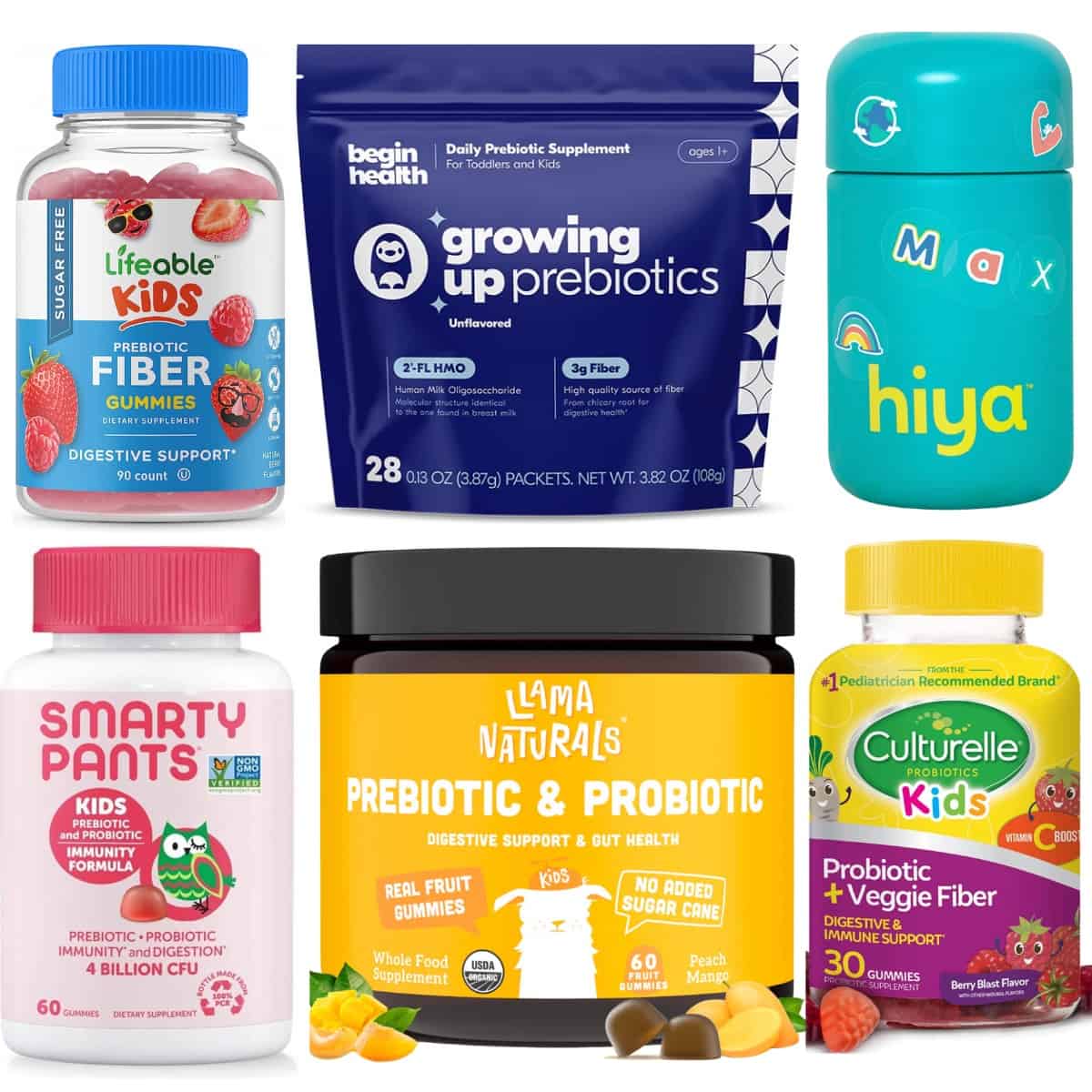
Our Methodology And A Disclaimer
As a board certified health coach and certified nutritionist, I support supplements that are rooted in science and are evidence-based. The FDA does not review dietary supplements for safety and effectiveness before they go to market, so I prioritize products that are third-party tested and certified by one of three independent third-party certifiers (USP, NSF, or ConsumerLab.com). This post has also been medically reviewed and fact checked by Christina Badaracco, MPH, RDN, LDN (see my about page for more info about Christina).
Though I may receive a commission (at no extra expense to you) if you purchase through some of the affiliate links provided, I only recommend products I’ve researched, evaluated, consulted experts on, and would feel comfortable giving to my own two children. As always, I only share products that are the highest quality and that can help you and your family the most. By purchasing any of these products from the links below, you help keep this blog running, so thanks for your support!
The information shared in this post is not a substitute for professional medical advice, diagnosis, or treatment. Never disregard or delay in seeking professional medical advice because of something you read here and always consult with your doctor to determine the proper administration and recommended dosage of supplements for your child.
The Gut Microbiome
The gut microbiome consists of the genetic material of the ecosystem of microbes that reside in the digestive tract – including the stomach, small intestines, and large intestines. The microbiota consists of trillions of live microorganisms such as bacteria, fungi, and parasites. These microbes may float around or attach to the gut lining, and can play a critical role in regulating the function and health of the host. The relationships are often symbiotic and can be beneficial to both the human and microorganism.
One of their most important roles is to support digestive function. They break down some components of food and can use them to produce beneficial nutrients for the body. This complex microbial ecosystem also plays a key role in functions of the immune system, cognition, respiration, the heart, and other areas
It’s important to maintain a proper balance within the gut microbiota for optimal health. Many factors can impact this balance, such as lack of certain foods or nutrient diversity, chronic stress, and antibiotic usage. The imbalance can lead to the bad microbes taking over, causing more susceptibility to illness, improper digestion, malabsorption of nutrients, and bowel issues.
What Are Prebiotics?
Prebiotics are a special type of substance in our diets that cannot be digested by the body but still impart health benefits (e.g. certain plant fibers) (source). Instead, the fibers or other substances serve as food for our gut bacteria, allowing them to grow and flourish within the gastrointestinal (GI) tract.
Supporting the “good guys” can help maintain or bring the gut back to proper balance so that the body can function effectively. While some people can naturally get all the fiber and other prebiotics needed through their diet, others may benefit from changing their diets and/or adding prebiotic dietary supplements! Gut health is so important for everyone, but young children are often overlooked.
How Are Prebiotics Different From Probiotics?
Probiotics are the live cultures of beneficial bacteria that serve to boost populations in the gut. Some people can benefit from supplementing with probiotics while others already have a proper balance of this bacteria in their GI tract through a diverse and healthy diet (among other genetic and lifestyle factors). Prebiotics are not to be confused as another type of live bacteria—rather, they are simply food for the “good guys” in the gut. (Source).
Why Do We Need Both?
Our body relies on beneficial bacteria, as they play a critical role in our digestion, immunity, and more. While it can be helpful to boost the body’s population with the use of probiotics, they also need prebiotics in order to survive. If you or your child does not naturally get a lot of fiber in your diet, it may help to take a prebiotic supplement. Just as you require healthy food, so do these strains of bacteria! We need both in order to maintain a healthy, balanced gut.
How Do I Know If My Child Needs A Prebiotic Supplement?
It is best to chat with your child’s pediatrician before beginning your little one on a prebiotic supplement, but there are a few obvious indicators. If your kid is a picky or selective eater, they are likely not consuming enough fiber on their own. Additionally, if your child has had to take a course of antibiotics, adding both prebiotics and probiotics could help to successfully repopulate healthy bacteria into their gut.
Other signs your child needs prebiotics include digestive issues, irregularity with bowel movements, and complaints about stomach aches. Your child should have well-formed stools on a daily basis, 1–3 times per day (source). There should not be any straining or discomfort when they go potty, and stool should be soft and smooth. Again, talk with your pediatrician, specialist, and/or registered dietitian nutritionist (RDN) about these indications so you can determine whether a supplement is appropriate and if so, the optimal composition and dosage.
Ingredients To Look For In Prebiotics For Kids
It’s best to find a simple prebiotic with minimal ingredients, preferably organic, and no artificial ingredients (or minimal additives). I love that Begin Health has just 2 ingredients – chicory root and human milk oligosaccharide. Each prebiotic supplement may use different prebiotics – for example, Begin Health uses HMOs, but Hiya uses larch tree fiber.
In addition to the actual prebiotic fiber, you want to look for other organic or non-GMO ingredients. The addition of fruits for natural flavor and coloring is great for gummies! To help correct other potential deficiencies, you can look for supplements with added vitamins and minerals such as vitamin D and vitamin C. Note: If your child has irritable bowel syndrome, you may want to consult your child’s pediatrician to figure out which prebiotic may work best.
Ingredients To Avoid
Avoid prebiotics that contain artificial sweeteners and added natural sugar. It really is unnecessary for a prebiotic, which can simply be just fiber alone in powder form! In addition, try to avoid artificial flavors and coloring, along with unnecessary filler ingredients. Begin Health and Hiya offer the best choices for a safe ingredient list, where you’ll also avoid most concerns for food allergies.
Best Prebiotics For Kids
Begin Health
Begin Health offers their Growing Up Prebiotics, a daily prebiotic supplement for kids with just 2 simple ingredients. This prebiotic provides a simple solution for getting more fiber into your child’s diet, allowing for digestive system support and healthy bowel movements. It comes in individual packets for convenient use. It also happens to be the only prebiotic you can use for kids as young as 1! (All of the others on our list below are for kids age 3-4 for the most part!)
The tasteless powder makes for an easy way to sneak this supplement into food, or even just warm or cool water. A big highlight for this prebiotic is that children 1 year old and up can take it! This offers much more availability compared to others on the market that are targeted for older children. You can use this as a prebiotic for baby, toddler, and on! (Learn More: Begin Health Review).
Ingredients Overview: Begin Health prebiotics contain just 2 ingredients: Human milk oligosaccharide (HMO) and chicory root fiber! HMOs are a prebiotic found in breast milk, which has been shown to have benefits for the immune system and intestinal microbiota in babies and kids (source).
Cost: $39 for a one time purchase or $33.15 for a subscribe & save deal (contains 28 servings)
What Customers Say:
“This has been the most amazing product. I was giving my daughter miralax and miners oil daily and she would still go days without pooping. 3 days after starting Begin I took her off both other products and now she goes everyday. It’s been over a year and I still give it to her and my son everyday.” (Source: From reviews on Begin Health’s website).
Pros
Cons
Hiya Pre + Probiotic
Hiya’s Kids Daily Probiotic offers a blend of both prebiotic fiber and probiotics, promoting healthy bowel movements and digestion. This one-a-day supplement is designed specifically for kids in chewable tablets. There are no gummy additives or added sugars making them one of the best combined pre + probiotics for kids!
Ingredients Overview: Includes probiotic strains Lactobacillus rhamnosus gg, Lactobacillus paracasei, and Bacillus lactis. The prebiotic is sourced from larch tree fiber.
Cost: $30 per bottle (currently 50% off your first order, contains 30 servings)
What Customers Say:
“Very happy with the way this has got things moving. I love that I don’t have to look up the ingredients, and my kids actually consume them.” (From reviews on Hiya’s website)
Pros
Cons
Llama Naturals Prebiotic & Probiotic
Llama Naturals prebiotic and probiotic gummies are made for kids 2 years old and up. They are clinically proven to help with stomach aches, constipation, and overall gut health (Source: Llama Naturals website). These gummies are certified organic and naturally sweetened and colored with fruit. If you’re wanting something organic, these may be the right probiotics for you! I especially like this prebiotic for toddlers with a selective taste preference, since these have a yummy strawberry flavor.
Ingredients Overview: Includes a blend of probiotics (including bacillus coagulans) and 500mg of prebiotic fiber (xylooligosaccharides).
Cost: $24.95 per jar, or subscribe and save 10% (contains 30 servings)
What Customers Say:
“The kids probiotic gummies were recommended by my sons naturopath doctor. They have made a huge difference in his health. No more constipation and stronger immune system! He loves the taste and asks for them every morning.” (Source: Llama Naturals reviews on their website).
Pros
Cons
Lifeable Kids Sugar Free Prebiotic
Lifeable Kids Prebiotic Fiber Gummies offer digestive support with a natural berry flavor. These sugar free gummies are suitable for kids ages 2 and up.
Ingredients Overview: Includes 4g of fiber per serving! You’ll find chicory root fiber, pectin, and agar agar in these gummy prebiotics for kids.
Cost: $18.52 per bottle (90 count, 45 servings)
What Customers Say:
“These work, and I don’t have to fight with my son to eat them. He doesn’t have trouble going to the bathroom much anymore and actually asks for these if I forget.” (From customer reviews on Amazon).
Pros
Cons
Zebora Prebiotic + Probiotic
Zebora Kid’s prebiotic and probiotic powder is suitable for 3 year olds and up. It uses quite a few different strains of bacteria, which makes it stand out from the others. This is another good option for prebiotics for toddler constipation and gut health.
Ingredients Overview: This toddler prebiotic and probiotic contains strains such as l. reuteri and lactobacillus casei, along with prebiotic inulin, polyglucose, resistant dextrin, and other ingredients. Note: This product does contain milk, so keep that in mind if your child is vegan, lactose-intolerant, or has a dairy allergy.
Cost: $15.89 per bottle (30 servings)
What Customers Say:
“We searched plenty of pre and probiotics for our little one and agreed to try this one due to the ingredients. It helped keep our little one regular and with it not having a taste, our little one is able to drink it with no problems. Highly recommend!” (From customer reviews on Amazon).
Pros
Cons
Intelligent Labs Pro + Prebiotic
These Kids Probiotics & Prebiotics are made with specific strains of friendly bacteria that can survive in stomach acid and bile, so you know they are making their way to the gut alive! These chewable probiotics are intended to support your child’s gut health and reduce gastrointestinal issues.
Ingredients Overview: These kids prebiotics include a proprietary blend of probiotics, along with guar fiber and fructooligosaccharides to promote a healthy gut microbiota.
Cost: $19.94 per bottle (60 servings)
What Customers Say:
“Bought this for my son who is continuously having tummy issues. This has helped immensely with the problems we were having and I will buy again.” (From customer reviews on Amazon).
Pros
Cons
Smarty Pants Gut + Immune Health
SmartyPants Kids Prebiotic and Probiotic gummies are designed to offer digestive and immune support for children 3 and up. They are naturally microencapsulated to ensure a 95% survival rate reaching your little one’s gut.
Ingredients Overview: These children’s probiotics include two strains of probiotics and prebiotic beta-glucan as well as organic sugar and some other ingredients.
Cost: $25.99 per bottle (30 servings – 2 servings per day / 60 count per bottle)
What Customers Say:
“These work Amazing for my Little one. They are the only ones I have found to help build her immune system up and keep it up!” (From customer reviews on Amazon).
Pros
Cons
Culturelle Kids Pre + Probiotics
Culturelle Probiotics for kids is suitable for children 3 years and up, offering probiotics, prebiotics, and vitamin C! This is a good option if you are looking for a little extra immune support.
Ingredients Overview: These gummy probiotics include bacillus subtilis and bacillus coagulans, along with prebiotic chicory root fiber and vitamin C (ascorbic acid).
Cost: $13.13 per bottle (30 servings)
What Customers Say:
“My kids think they taste good and they keep him regular. Has been taking them daily for over a year.” (From customer reviews on Amazon).
Pros
Cons
What Are Good Food Sources Of Prebiotics For Kids?
In addition to supplementing, there are also foods containing prebiotics that can be added to your child’s diet. The top 5 prebiotic-containing foods include onions, garlic, Jerusalem artichoke, dandelion greens, and leeks (source). These have the highest amount of prebiotic fibers within them. However, other prebiotic foods may be more kid-friendly, such as bananas (ideally slightly green), potatoes, kiwi, oats, chicory root, and asparagus. You can allow potatoes to cool first to form resistant starch (which is not digested and can instead be broken down by bacteria) and then they can be reheated (source).
Do Prebiotics Have Side Effects?
Side effects of prebiotics should not impact your child long term. Your child may initially experience some common issues such as mild abdominal pain from gas and bloating during the first week. This is normal when introducing new fiber supplements for toddlers and adults alike (source). You may want to talk to your pediatrician about starting with a lower dose and increase a little bit every few days. This will minimize any potential problematic symptoms and help your child’s gut adjust to the additional fiber.
Who Should Not Take Prebiotics?
Prebiotics are not recommended for those with health conditions such as small intestinal bacterial overgrowth (SIBO) or other immuno-deficiencies. In these cases, the use of both probiotics and prebiotics will not have the same beneficial effects and may instead exacerbate the symptoms. It is always a good idea to consult with a professional for any medical advice.
FAQs
Yes! It is actually best to take prebiotics every day to see results. If your child’s diet is naturally lacking in these types of prebiotic fibers, using a daily supplement can help to keep those beneficial bacteria happy and thriving.
The prebiotics should begin to feed the healthy bacteria in your child’s gut, allowing these organisms to grow and thrive. In turn, this can help your child’s system to function more efficiently and effectively. You should see improved digestive function and more regularity with bowel movements. Prebiotics for constipation in kids can be a effective solution! Prebiotics can also help your little one absorb some nutrients better and promote a healthy immune system.
It depends, but many will notice a positive change right away! However, every child is different and their microbiota will vary. In some cases it can take weeks to see the full effects, but you may notice things are heading in the right direction after the first few servings.
You certainly can! Prebiotics and probiotic bacteria can work really well together and complement one another. Many probiotics on the market even include prebiotics within the formula for added health benefits. In order to survive and thrive, live active cultures need prebiotic fiber (either in food or from supplements). Taking them together can increase the positive outcomes for these colony-forming units. If you have any concerns or uncertainty about the right product, dosage, etc., talk with your child’s health care provider.
While it is possible to consume too many prebiotics, generally there will not be any long term effects from doing so. You may experience bloating, gas, and diarrhea after taking too large a quantity of prebiotics. From there, you can reduce the dosage, which might help bring about a more positive impact from the prebiotics. Keep in mind that when first introducing prebiotics for kids, there may be an adjustment period with bloating and gas. If this does not go away after a few days, you may need to try a smaller dose, try a different product, or further investigate other potential causes of symptoms.
Final Thoughts
I hope you found this post to be a helpful tool for deciding if prebiotics are a good fit for your child. Overall, prebiotics in supplement form can be very beneficial for increasing a child’s fiber intake and supporting a healthy gut. It’s important to understand what they contain and how they can be consumed to optimize their effectiveness.
I find that Begin Health offers the best prebiotic supplements on the market with their tasteless and textureless powder! You can conveniently add it to just about anything! If you are looking to have the added benefits of probiotic supplements, I’d recommend combining Begin Health with Hiya as it is one of the best probiotic supplements for kids while also containing a little bit of prebiotic fiber.
Whatever direction you go, I hope you are able to find comfort for your little one’s tummy, with regular bowel movements, better digestion, and proper nutrient absorption!



